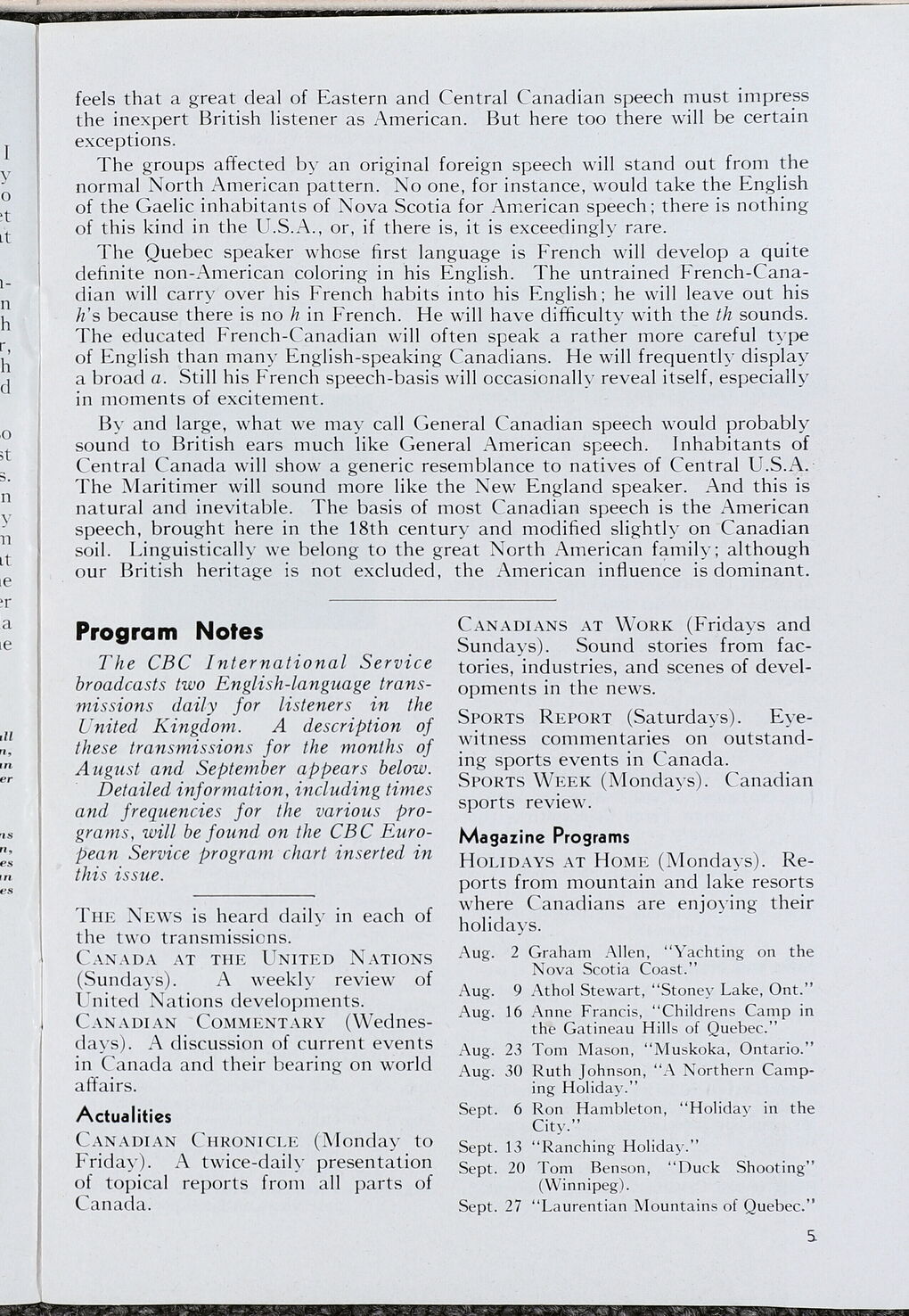
Full resolution (JPEG) - On this page / på denna sida - The Impact of Canadian Speech on British Ears, by Henry Alexander - Program Notes

<< prev. page << föreg. sida << >> nästa sida >> next page >>
Below is the raw OCR text
from the above scanned image.
Do you see an error? Proofread the page now!
Här nedan syns maskintolkade texten från faksimilbilden ovan.
Ser du något fel? Korrekturläs sidan nu!
This page has never been proofread. / Denna sida har aldrig korrekturlästs.
feels that a great deal of Eastern and Central Canadian speech must impress
| the inexpert British listener as American. But here too there will be certain
exceptions.
: The groups affected by an original foreign speech will stand out from the
= normal North American pattern. No one, for instance, would take the English
t of the Gaelic inhabitants of Nova Scotia for American speech; there is nothing
je of this kind in the U.S.A., or, if there is, it is exceedingly rare.
The Quebec speaker whose first language is French will develop a quite
2 definite non-American coloring in his English. The untrained French- Cana-
dian will carry over his French habits into his English; he will leave out his
i h’s because there is no h in French. He will have difficulty with the th sounds.
: The educated French-Canadian will often speak a rather more careful type
h of English than many English-speaking Canadians. He will frequently display
d a broad a. Still his French speech-basis will occasionally reveal itself, especially
in moments of excitement.
à By and large, what we may call General Canadian speech would probably
4 sound to British ears much like General American speech. Inhabitants of
Central Canada will show a generic resemblance to natives of Central LPS
a The Maritimer will sound more like the New England speaker. And this is
= natural and inevitable. The basis of most Canadian speech is the American
I speech, brought here in the 18th century and modified slightly on Canadian
ad soil. Linguistically we belong to the great North American family ; although
a | our British heritage is not excluded, the American influence is dominant.
Je
a Program Notes CANADIANS AT WORK (Fridays and
ie : ; Sundays). Sound stories from fac-
The CBC International Service tories, industries, and scenes of devel-
broadcasts two English-language trans- opments in the news.
missions daily for listeners in the À : :
Bil United Kangdom A descraption of, POR) ORE OM RS
n, | these transmissions for the months of WUDESS COMMENTAIRES ON. User
i August and September appears below. Sk REN SE Me: RN di
| Detailed information, including times PORTS WEEK (Mondays). Canadian
and frequencies for the various pro- SPOrts review.
s | grams, will be found on the CBC Euro- Magazine Programs
ui | Gents Dave program chart mserted in Horrpavs at HOME (Monde Re
im AN USNS) :
ports from mountain and lake resorts
where Canadians are enjoying their
holidays.
es
THE News is heard daily in each of
the two transmissions. ets
| CANADA AT THE UNITED Nations Aug. 2 Graham Allen, “Yachting on the
: À 3 : Nova Scotia Coast.
(Sundays). A weekly review of | >
Troe: ENT: x Aug. 9 Athol Stewart, ‘‘Stoney Lake, Ont.
United Nations developments. RS RE Ga cn
à à 7 J . 1 = € S; S
| CANADIAN COMMENTARY (Wednes- 8 =
: 5 the Gatineau Hills of Quebec.”
| days). A discussion of current events Aug. 23 Tom Mason, ‘‘Muskoka, Ontario.”
in Canada and their bearing on world Aug. 30 Ruth Johnson, “A Northern Camp-
affairs. ing Holiday.”
Actualities Sept. 6 Ron Hambleton, “Holiday in the
City.”
CANADIAN C HRONICLE (Monday to Sept. 13 “Ranching Holiday.”
Friday). A twice-daily presentation Sept. 20 Tom Benson, “Duck Shooting”
of topical reports from all parts of (Winnipeg).
Canada. Sept. 27 ‘‘Laurentian Mountains of Quebec.”
5.
<< prev. page << föreg. sida << >> nästa sida >> next page >>